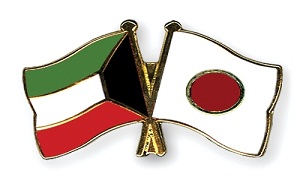
Kuwait’s trade surplus with Japan widened 1.3 percent in July to JPY 88.5 billion (USD 858 million) from a year earlier, expanding for the second month in a row on solid exports, the Finance Ministry said Wednesday.
Kuwait maintained black ink with Japan for the 78th consecutive month, the ministry said in a preliminary report carried by KUNA.
Kuwaiti overall exports to Japan grew 1.7 percent to JPY 104.4 billion (USD 1.0 billion) for the second consecutive monthly increase, and imports from Japan gained 4.0 percent year-on-year to JPY 15.9 billion (USD 154 million), up for the first time in two months.
Middle East’s trade surplus with Japan also widened 7.0 percent to JPY 1.116 trillion (USD 10.8 billion) last month, with Japan-bound exports from the region growing 9.6 percent from a year earlier.
Crude oil, refined products, liquefied natural gas (LNG) and other natural resources, which accounted for 97.6 percent of the region’s total exports to Japan, rose 9.4 percent.
The region’s overall imports from Japan grew 23.0 percent, thanks to robust shipments of automobile, machinery, and steel.
Japan’s global deficit narrowed in July for the first time in two months, as exports grew. The world’s third-biggest economy posted a trade deficit of JPY 964.0 billion (USD 9.3 billion), down 6.6 percent on the year. But it still marked the 25th straight month of shortfall for the longest losing streak since comparable data became available in January 1979.
Overall exports went up 3.9 percent to JPY 6.189 trillion (USD 60.0 billion), the first rise in three months, chiefly due to increased shipments of automobiles and electric machinery. Imports grew 2.3 percent to JPY 7.153 trillion (USD 69.3 billion), up for the second straight month as fossil fuel imports continued to rise. Japanese utilities have boosted fuel imports for thermal power generation, as the country’s 48 commercial reactors are currently offline in the wake of the radiation accident in March 2011 at the Fukushima Daiichi nuclear power plant.
Exports to China, Japan’s biggest trading partner, gained 2.6 percent, and imports from the country fell 2.5 percent, still posting a deficit with China for the 29th straight month.
Japan’s currency weakened against the US dollar by 2.9 percent the year before, according to the ministry.
The yen’s depreciation supports exports by making Japanese products more competitive overseas and increase the value of repatriated overseas earning, but it also inflates import prices.
Source : WAM News Agency for United Arab Emirates












